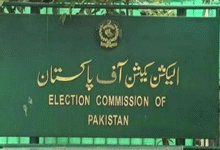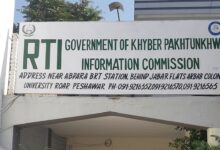IHC declares information about judges’ perks & privileges as public documents
The IHC, in its order, also directed the Ministry of Law and Justice to provide information to citizens in compliance with the order of the Pakistan Information Commission.
ISLAMABAD: The Islamabad High Court (IHC) has declared the information about the perks and privileges of judges as public documents and directed the Ministry of Law and Justice to provide information with citizens in compliance with the order of Pakistan Information Commission (PIC).
The IHC registrar through a letter, sent to the Ministry of Law and Justice secretary, stated that perks and privileges of the Judges of the High Court are governed under the Presidential Orders issued by the competent authority, in exercise of powers conferred under Article 205 of the Constitution of Pakistan, and such orders are public documents and available on the website of IHC.
The letter further states that neither the IHC Chief Justice nor any of its sitting judges have applied to any government authority for allotment of plot nor any plot has been allotted.
Through another letter [dated July 30, 2021], the registrar added that information regarding allotment of plots to former Judges of IHC is personal to their Lordships. However, information about pension and post retirement benefits of former Judges are also governed by Presidential Orders and the same are also available on the website of the High Court.
Earlier, the registrar office in response to a notice of PIC, issued on identical appeals filed by the members of Women Action Forum, have stated that while dealing with the queries receiving from any quarter under Right of Access to Information Act, 2017″, the IHC is following the policy elucidated by the apex [in its letter No. F.1/18/2009-SCA, dated 30.09.2014] and the same position is applicable to IHC.
It also states that the Constitution contains a full-fledged mechanism of internal checks and balances on the working of the Courts in the form of appeal, review, etc.
In this regard, Article 203 of the Constitution mandates the High Courts to supervise and control the Courts subordinate to them.
AS regards the working of the Superior Courts, the Constitution does not entrust such a function to any outside institution/other organ of the State, rather leaves it to such Courts themselves.
It may be noted here that the Constitution does not envisage oversight in any form by any other institution of the State on the functioning of the Courts. This position may kindly be appreciated while dealing with the queries received from the concerned quarters.
The Commission through in an order decided that the registrar offices of the IHC and The SCP come within the definition of public body under Section 2 (xi) (e) of the Right of Access to Information Act, 2017, and the letter shared by the registrar officers of the respective courts of administrative nature and not a judgment.
“This Commission is of the view that the exercise of constitutional and statutory right of citizens in matters of public importance through the Act is neither likely to, nor, designed to curtail independence of the superior judiciary. This commission also believes that exercise of constitutional right of access to information in matters of public importance through the Act cannot be equated with executive oversight of superior judiciary,” the PIC order states.
The order further states, the categories of information to be proactively disclosed under Section 5 of the Act have no bearing on the independence of the judiciary. Similarly, the information to be provided to the applicants under Section 6 of the Act is also not in conflict with the independence of the judiciary.
In the said order, the concerned was directed to share the information about perks and privileges of the Judges with the applicants within seven working days, however the Ministry in response to the order sought opinion from the registrar office of IHC.
The registrar has declared the requested information as public documents and directed the Ministry of Law and Justice to share the information with the applicants.






